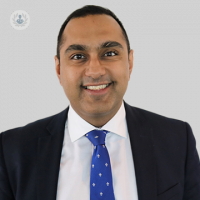How do we diagnose and treat a blocked nose?
Written in association with:If you have a blocked nose that isn’t going away, it’s worth a visit to a specialist ENT surgeon. In this article award-winning otolaryngologist Mr Raj Lakhani explains how an ENT surgeon investigates and diagnoses a blocked nose, and what your treatment options might be.

How are nose problems diagnosed?
Diagnosing nose problems involves asking about your medical history and symptoms, and doing some simple examinations. All of this happens within one consultation.
Taking your medical history
It’s vital that a careful history is taken. We would focus on your concerns about the blockage, really trying to assess the nature of the blockage, and asking specific questions about possible trauma to the nose or if the blockage is on one side or the other as this gives a good idea regarding the cause of the blocked nose. We would look at any associated symptoms such as mucus, facial pain or problems with your sense of smell. We would also assess for any allergic symptoms such as itchiness and watery eyes, eczema and asthma.
Clearly it’s important to also ascertain any relevant past medical history and current medications. Some medications can cause nasal blockage. We would also discuss whether you smoke – you can quickly improve your nose and sinus health just by stopping smoking, as the lining in the nose is the same as in the lungs.
Finally, we’d make sure we have an understanding of your occupation or hobbies to be able to understand the problems you have with your nose, and tailor your treatment plans so that your nose can work best in the environment you are in. For example, your priority might be to be able to smell foods, or if you’re an athlete or enjoy running, to breathe as easily as possible.
After a careful discussion about your symptoms, we would then examine your nose.
Examinations
We start with a simple external examination – trying to assess if there are structural abnormalities which may be affecting the function of the nose, but also how the nose looks.
Then we would assess your nose while you’re breathing, both gently and forcibly, and assess for any obvious collapse of the side walls of the nose.
Finally we assess the partition of the nose (the septum) with a headlight or torch, or examine further back using a fibreoptic endoscope. A fibreoptic endoscope can examine:
- the partition of the back of the nose
- the lining of the nose
- the post-nasal space (space behind the nose)
- the turnibates (they are normal swellings in the nose which can become bigger as a result of chronic swelling or allergies)
- the sinus openings, for any chronic inflammation, infection, or polyps.
The endoscopic examination of the nose gives a huge amount of detail about the health of the nose and the reasons why it may be blocked. It is easily and comfortably performed during you first consultation.
Imaging such as an X-ray isn’t usually necessary – unless specific treatment is advised for your condition in which case a more detailed scan would be ordered such as a CT or MRI scan.
What will my treatment options look like?
After a careful clinical assessment and examination, a personalised treatment plan will be made to optimise your nose and address all of the problems that were highlighted.
If you have a structural problem with the nose, such as with the partition being bent or an external deformity of the nose, then medication is unlikely to help – the most effective way to help you breathe better would be surgery to correct the bend in the partition of the nose, or correct the shape of the nose which is causing the problem.
If you are diagnosed with a problem with the lining of the nose, medication is usually more useful, in the form of nasal washes, drops or sprays (delivered directly). Sometimes tablet steroids, antibiotics, or antihistamines are also advised.
If medicine doesn’t work for problems with the lining of the nose, surgery can be very effective. We can aerate the sinuses, shrink down the swollen lining, and also conduct sinus surgery to help with breathing. Sinus surgery is extremely effective at treating nasal and sinus symptoms which are persistent or resistant to medical treatment.
Finally, surgery is commonly recommended in the case of nasal polyps, as your breathing will become much easier if they do not respond to medication and are removed with surgery.


